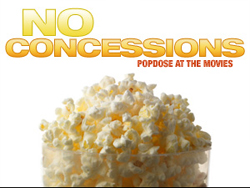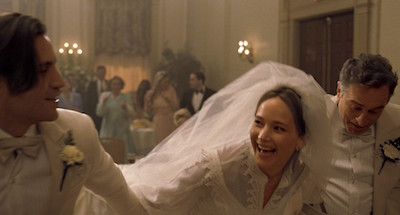 The David O. Russell who made the edgy Flirting with Disaster (1996) and Three Kings (1999) is a different David O. Russell from the one who makes hit movies with Jennifer Lawrence today. It’s obviously a winning combination, sweetened with Oscar nominations and an Academy Award for her for Silver Linings Playbook (2012). But I’m immune to their chemistry, finding that film hopelessly contrived and the followup, American Hustle (2013) borderline silly, a game of movie star dress-up adapted from true events. I got that sinking feeling pretty quickly with their latest, Joy, which begins with, and occasionally returns to, scenes from a banal soap opera, stiffly written, directed, and acted, as if Russell had never seen a daytime show. Is it supposed to be parodic? A commentary on something–but on what, as the movie has just started? Is the publicist still here? Can I just sneak out…?
The David O. Russell who made the edgy Flirting with Disaster (1996) and Three Kings (1999) is a different David O. Russell from the one who makes hit movies with Jennifer Lawrence today. It’s obviously a winning combination, sweetened with Oscar nominations and an Academy Award for her for Silver Linings Playbook (2012). But I’m immune to their chemistry, finding that film hopelessly contrived and the followup, American Hustle (2013) borderline silly, a game of movie star dress-up adapted from true events. I got that sinking feeling pretty quickly with their latest, Joy, which begins with, and occasionally returns to, scenes from a banal soap opera, stiffly written, directed, and acted, as if Russell had never seen a daytime show. Is it supposed to be parodic? A commentary on something–but on what, as the movie has just started? Is the publicist still here? Can I just sneak out…?
 I stuck it out, and to my surprise, Joy rallied around me. Very loosely adapted from the story of home shopping magnate Joy Mangano, whose Miracle Mop caused a sensation on QVC in 1990 and led to an empire of helpful houseware products, the movie gives Lawrence a chance to tear into a role that Joan Crawford and Barbara Stanwyck would have killed to play in the 40s. Joy’s biggest obstacle to business success isn’t her lack of experience, dubious partners or a succession of doors that close as soon as they open–it’s her awful family, including her undercutting father (Robert De Niro, who in his senior years has swapped Scorsese for Russell), her mother, the soap addict, who languishes in bed all day (Virginia Madsen), and her ex-husband (Edgar Ramirez), who thinks he’s a lounge singer on scant evidence of talent. All end up living under Joy’s dilapidated roof, with only her grandmother (Diane Ladd) holding out much hope that she can translate her youthful whiz kid ambitions into something concrete. That something turns out to be her self-wringing mop, which her dad’s girlfriend, a wealthy widow (Isabella Rossellini), agrees to finance. But there are strings attached, and a QVC executive (Lawrence and De Niro’s other Russell stock company player, Bradley Cooper) adds a few more as the Miracle Mop (never named in the film) makes its fateful debut.
I stuck it out, and to my surprise, Joy rallied around me. Very loosely adapted from the story of home shopping magnate Joy Mangano, whose Miracle Mop caused a sensation on QVC in 1990 and led to an empire of helpful houseware products, the movie gives Lawrence a chance to tear into a role that Joan Crawford and Barbara Stanwyck would have killed to play in the 40s. Joy’s biggest obstacle to business success isn’t her lack of experience, dubious partners or a succession of doors that close as soon as they open–it’s her awful family, including her undercutting father (Robert De Niro, who in his senior years has swapped Scorsese for Russell), her mother, the soap addict, who languishes in bed all day (Virginia Madsen), and her ex-husband (Edgar Ramirez), who thinks he’s a lounge singer on scant evidence of talent. All end up living under Joy’s dilapidated roof, with only her grandmother (Diane Ladd) holding out much hope that she can translate her youthful whiz kid ambitions into something concrete. That something turns out to be her self-wringing mop, which her dad’s girlfriend, a wealthy widow (Isabella Rossellini), agrees to finance. But there are strings attached, and a QVC executive (Lawrence and De Niro’s other Russell stock company player, Bradley Cooper) adds a few more as the Miracle Mop (never named in the film) makes its fateful debut.
Joy isn’t unalloyed. Going for an improvisatory feel, Russell lets a few threads of his own dangle (Joy’s kids flop in and out of the movie) and the cutting is choppy, as if the four editors were shaping the movie on the fly. Cutesy, unworkable devices like the soap stuff, with guest roles for Susan Lucci and Donna Mills (which the film does abandon, fortunately) should have gone out as the screenplay weathered its own identity crisis. The core of Joy is the character’s very shakeable belief in her herself, as she fails as many tests as she passes, and is forced into long-avoided confrontations. Down and out, then up and up (and down again) Lawrence is sensational, and the movie has plum roles for all its prominent women, notably the hissing, suspicious, yet never altogether wrong, Rossellini. Joy works best when it gets down to brass tacks and observes how a serf becomes a master, a lesson for us all in our own increasingly entrepreneurial era.





Comments